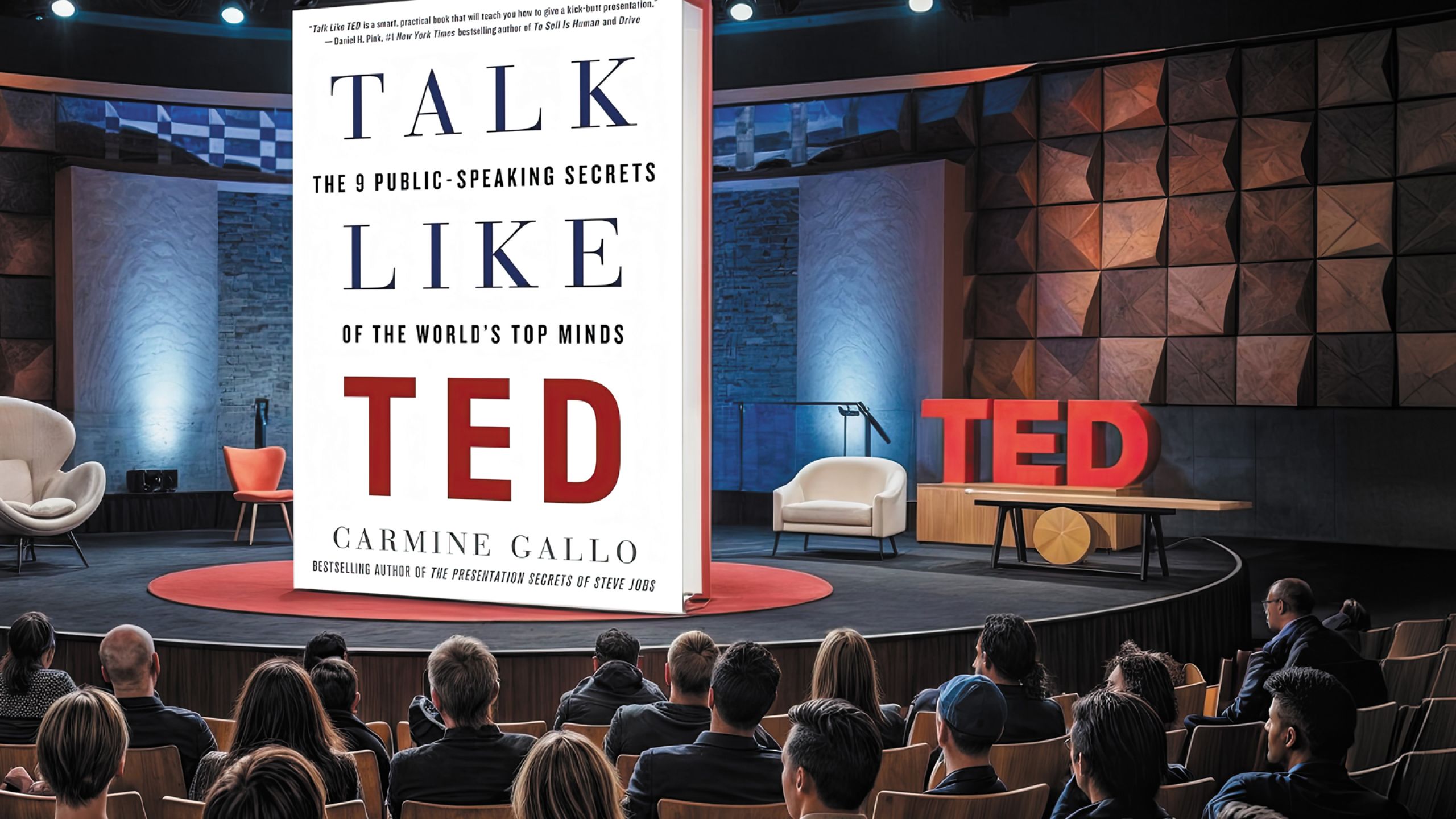Talk Like TED

In This Article
-
The book is like a backstage pass to the art of persuasion, the science of inspiration, and the power of transformation.
-
Whether you're an aspiring speaker, a business leader, or someone who seeks to communicate ideas effectively, this book offers invaluable insights and practical advice to help you command the stage and share your message with the world.
In a world where ideas hold the power to transform lives, Talk Like TED by Carmine Gallo becomes the guiding light for those who aspire to captivate, inspire, and change the world through the art of public speaking. Imagine a stage where the most brilliant minds converge, where innovation, inspiration, and insight take center stage. This book takes you behind that stage – the scenes of TED Talks – unveiling the secrets of the world's most influential speakers.
Carmine Gallo, a master storyteller and communication expert, delves into the hearts and minds of TED's most renowned speakers. He analyzes their presentations, uncovering techniques that make these talks not just informative but compelling. The book is like a backstage pass to the art of persuasion, the science of inspiration, and the power of transformation. Whether you're an aspiring speaker, a business leader, or someone who seeks to communicate ideas effectively, this book offers invaluable insights and practical advice to help you command the stage and share your message with the world. Drawing from real-life examples and actionable insights, Gallo provides a roadmap for becoming a more compelling and influential communicator.
Gallo presents nine key principles that transform ordinary speakers into extraordinary ones. He highlights the importance of forming an emotional connection with the audience, as exemplified by Sir Ken Robinson's TED talk, "Do Schools Kill Creativity?" Robinson's humorous anecdotes build an emotional bond, making his talk more than just informative. Storytelling is emphasized as a cornerstone of effective communication, demonstrated by Chimamanda Ngozi Adichie's talk, "The Danger of a Single Story," where personal narratives challenge stereotypes and highlight diverse perspectives. Simplicity in messaging is another key aspect, as shown by Dr. Jill Bolte Taylor's talk, "My Stroke of Insight," where a singular idea leaves a lasting impact.
Visuals play a crucial role in enhancing presentations, with Hans Rosling's talk, "The Best Stats You've Ever Seen," using dynamic visuals to convey complex data compellingly. Delivery skills are essential, as seen in Bryan Stevenson's talk, "We Need to Talk About an Injustice," where voice modulation and body language enhance emotional resonance. Cultivating wonder is exemplified by Brian Greene's talk, "Making Sense of String Theory," which transforms complex scientific concepts into captivating narratives. Creating jaw-dropping moments is highlighted by Jamie Oliver's talk, "Teach Every Child About Food," where shocking statistics motivate action. The art of persuasion is demonstrated by Brené Brown in her talk, "The Power of Vulnerability," where she uses research and anecdotes to persuade the audience to embrace vulnerability. Finally, connecting with universal themes, as Brené Brown does, ensures that messages resonate with a broad audience by tapping into shared human experiences.
Also featuring lessons from influential figures like Sir Ken Robinson, Chimamanda Ngozi Adichie, and Dr. Jill Bolte Taylor, this book is a must-read for aspiring speakers, educators, leaders, and anyone seeking to harness the power of persuasive and inspiring communication. It equips readers with the tools and knowledge to leave a lasting impact, connect emotionally with audiences, and convey ideas with clarity, conviction, and authenticity.
Public speaking did not emerge with TED talks. We find in human history many examples of inspiring speeches in which we can see some of the techniques mentioned above successfully used.
Prophet Muhammad's Farewell Sermon during his final pilgrimage to Mecca exemplifies the power of emotional connection. He connected with his followers by emphasizing equality and unity, famously stating, "Your Lord is one, and your father is one: all of you are of Adam, and Adam was of soil. An Arab has no superiority over a non-Arab, nor does a non-Arab have any superiority over an Arab; a white has no superiority over a black, nor does a black have any superiority over a white; none have superiority over another except by piety and good action."
The Prophet’s use of delivery skills is seen in the narrative of the "Night Journey and Ascension" (Isra and Mi'raj), where he described his miraculous journey from Mecca to Jerusalem and ascension through the heavens, captivating his audience and strengthening their faith in his divine mission.
Similarly, Jesus often used parables to convey profound spiritual lessons. His ability to connect emotionally is evident in the Gospel of Luke, where he shows compassion by raising the widow of Nain's son from the dead, forming a powerful emotional bond with his followers. Jesus' storytelling prowess is highlighted in the Parable of the Good Samaritan, which illustrates compassion and mercy, making his message accessible and memorable.
Moses demonstrated the power of a singular idea and persuasive communication in his interactions with Pharaoh. He conveyed the powerful message, "Let my people go," symbolizing liberation for the Israelites. His dialogue with Pharaoh showed his persuasive skills, as he presented evidence through miracles and the consequences of Pharaoh's actions, ultimately persuading him to release the Israelites.
These examples from the lives of the Prophets highlight how they applied the public speaking secrets discussed in 'Talk Like TED' centuries ago to connect emotionally, convey powerful messages, and inspire their followers. Their timeless teachings continue to resonate with millions around the world, emphasizing the enduring power of effective communication.









